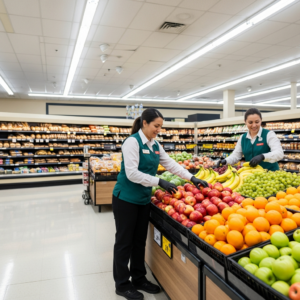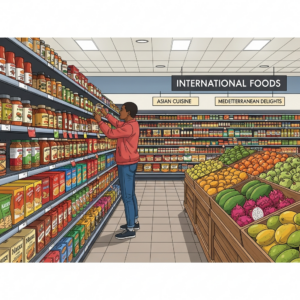Halal Meat Markets in Naperville, Illinois: Quality and Value Tips for Everyday Shopping
Naperville’s halal meat markets are thriving, and that is great news for home cooks who care about flavor, consistency, and kitchen efficiency. Whether you are stocking up for family meals, planning weekend grilling, or exploring new cuts like lamb shanks or goat shoulder, you will find that quality and value go hand in hand when you shop with a plan. This guide focuses on how to evaluate freshness, ask the right questions, and build habits that protect your food budget without compromising taste. If you want to start by browsing an organized overview of halal-friendly market products, use it as inspiration and then apply the tips below to your next in-person visit.
Quality First: What to Look For in the Case
Great value begins with great fundamentals. When you step up to the butcher case, scan for bright, natural color and firm texture. Packages should be clean and well sealed, with minimal excess liquid. Labels should be clear, with recognizable cut names. A tidy, well-lit display suggests organized storage and attentive staff. Look for halal certification signage or supplier details; when in doubt, ask about sourcing, handling, and separation from non-halal items. Trustworthy markets welcome questions and are happy to explain their process.
Turnover matters too. Busy markets that restock frequently are more likely to offer fresh selections. That does not mean you should avoid quieter hours—sometimes you will receive more personalized attention—but it is smart to ask staff which days they typically receive deliveries. Align your shopping with those windows for the widest variety and best texture.
Getting Value Without Sacrificing Taste
Value is not only about spending less; it is about choosing cuts and methods that yield more enjoyment per meal. Chicken thighs, beef chuck, and lamb shoulder excel in stews, braises, and grills, delivering rich flavor with forgiving cook times. Whole chickens offer flexibility for multiple meals and homemade stock. Goat shoulder is a champion of low-and-slow techniques that reward patience with depth and aroma. Ask butchers for offal and bones—liver, heart, and marrow bones are nutrient-dense and transform soups and sauces.
Portioning is a major lever. Freeze in meal-sized bundles, label clearly, and rotate stock so nothing gets lost. Batch-cook base components: braised beef for three meals, roasted chicken for sandwiches and salads, and a pot of stock for a quick soup later in the week. With a rhythm like this, you get quality on your plate with minimal waste.
How to Talk to Your Butcher (And Why It Saves Money)
- Be specific with recipes. Share what you are cooking; staff can recommend the best cut and portion size.
- Ask for trims or custom grinds. Tailored prep can prevent overbuying and speed up cooking.
- Explore value cuts. Butchers can point out items that perform like premium cuts when cooked properly.
- Plan for leftovers. Request portions that fit your meal plan so you repurpose efficiently.
Build a Pantry That Makes Meat Shine
Quality halal meat deserves good support. Keep spices like cumin, coriander, turmeric, paprika, and black pepper on hand. Stock staples—onions, garlic, tomatoes, lemons, rice, and flatbreads—so dinner feels effortless. A reliable marinade base (yogurt or olive oil, garlic, salt, and citrus) transforms budget-friendly cuts. Quick pickles, fresh herbs, and yogurt sauces add brightness to rich meats, making every bite feel balanced.
Midweek Check-Ins to Stay Organized
Staying organized avoids last-minute splurges and ensures you cook what you buy. Midweek, take five minutes to review freezer labels and plan two to three meals you can execute with what you have. If you prefer a visual nudge, browse a curated gallery of halal-friendly market products to spark ideas and create a quick list for your next visit. This habit reduces waste and keeps your fridge stocked with purpose.
Techniques that Multiply Flavor
Use high heat to sear steaks and kebabs for a crust that locks in juices. Braise tougher cuts in a covered pot with aromatics until fork-tender. Roast whole poultry or large lamb legs with a thermometer for precision. Grind spices fresh when possible and bloom them in oil to release aroma. Balance richness with acidity—lemon juice, vinegar, or tomatoes—and finish with herbs for freshness. Control salt carefully and taste as you go. Rest meats after cooking, especially roasts and thicker chops, so juices redistribute.
Storage and Food Safety
Transport meat quickly and keep it cold. Store raw items on the lowest refrigerator shelf in leakproof containers. Freeze portions you will not cook within a safe window, labeling by cut and date. Thaw in the refrigerator or in cold water, changing the water frequently. Use separate boards for raw meat and ready-to-eat foods, sanitize surfaces, and wash hands thoroughly. Rely on a thermometer for doneness; safe cooking is delicious cooking because it protects texture as well as health.
Seasonal Shopping in Naperville
Summer invites grilling—skewers, burgers, and quick-seared steaks—while winter calls for slow roasts, stews, and hearty soups. During holidays, halal markets often expand selections with special cuts and whole-muscle roasts. Plan ahead for gatherings: reserve items, request custom trims, and schedule pickup during calmer hours. If you want to experiment with new recipes, add one new cut per week and ask the butcher for a quick primer on technique.
Frequently Asked Questions
Q: How do I confirm that a market’s meat is halal? A: Look for certification signage and ask about suppliers and handling procedures. Reputable shops will explain how they prevent cross-contamination.
Q: Which cuts deliver the most value? A: Chicken thighs, beef chuck, lamb shoulder, and goat shoulder are flavor powerhouses when slow-cooked, grilled, or roasted properly.
Q: Can I request special cuts or custom grinds? A: Yes. Describe thickness, cube size, or grind ratio. Custom prep helps you cook efficiently and avoid waste.
Q: How do I plan meals to avoid overbuying? A: Choose two staple proteins and one “explore” cut each week, portion for the freezer, and build menus around pantry staples.
Q: What if I am new to cooking lamb or goat? A: Start with shoulders and shanks for slow cooking. Ask for guidance on timing and spice combinations.
Q: How should I store meat after shopping? A: Refrigerate promptly, freeze extras in labeled portions, and thaw safely in the refrigerator or in cold water with frequent changes.
Your Next Great Trip to a Naperville Halal Market
Quality and value are a pairing you can control with good habits. Choose markets that are clean and transparent, talk to your butcher, and build a pantry that supports bold, balanced flavors. Plan your week, portion smartly, and cook with techniques that flatter each cut. For quick inspiration before you head out, review a cleanly organized catalog of halal-oriented market products, finalize your list, and enjoy the confidence that comes from shopping Naperville’s halal markets with a clear, practical plan.




